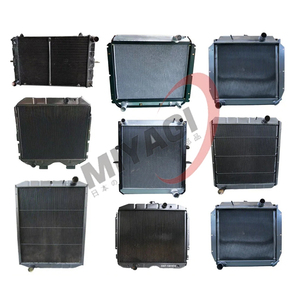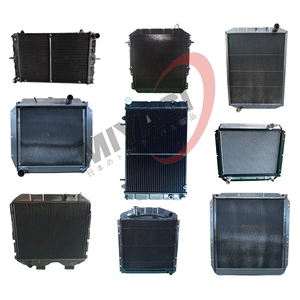(118587 products available)




























 Ready to Ship
Ready to Ship





































































































































































An aluminum radiator is a heat exchange device made of aluminum used to cool and regulate temperatures in various applications. Aluminum radiators are commonly used in automotive, motorcycle, and other applications. Here are the different types:
Automotive Radiators:
These radiators are used in cars, trucks, and other vehicles. They cool the engine by transferring heat from the engine coolant to the air. Engine Coolant Radiator, Oil Cooler Radiator, Transmission Cooler Radiator, and Dual-Pass Radiators are some types of automotive radiators.
Motorcycle Radiators:
These are specifically designed for motorcycles. They are generally smaller and lighter than car radiators. They also cool the engine coolant to regulate the motorcycle's engine temperature. Aluminum Motorcycle Radiators are the most common type of motorcycle radiator.
Heat Radiators:
These radiators disperse heat directly to the air in a room or area. They are used in homes and commercial buildings for heating. Hot Water Radiators and Steam Radiators are some of the heat radiator types.
Intercoolers:
These are a type of aluminum radiator. They cool the air from the turbocharger or supercharger before it enters the engine. This process helps increase engine power and efficiency.
Oil Coolers:
These radiators cool the engine oil or transmission fluid. Properly cooled oil helps protect the engine or transmission from overheating and reduces friction.
AC Condensers:
These are used in air conditioning systems. They convert the refrigerant gas into liquid form to cool the air inside the car.
Custom Radiators:
These are designed for specific applications or high-performance vehicles. They are tailored to meet unique cooling requirements and engine configurations.
Aluminum radiators are preferred because of their light weight, high thermal conductivity, and resistance to corrosion. These features make them useful in different applications. They include:
Cooling
Aluminum car radiators are primarily used to cool fluids and gases in different applications. They dissipate heat from the fluid or gas to the environment efficiently. This is because of their high thermal conductivity. For example, aluminum oil cooler radiators are used to cool engine oil, transmission fluid, or coolant in vehicles and machinery.
Heat Dissipation
These radiators are also used to dissipate heat in applications such as electronics. They provide a simple and cost-effective way of removing heat from electronic components, such as CPUs and GPUs. Their direct contact design allows for efficient heat transfer from the electronic component to the radiator.
Lightweight Construction
Aluminum is a lightweight material. As a result, aluminum radiators are preferred in applications where reducing weight is important. For example, in racing cars, lightweight aluminum radiators help reduce the car's overall weight without compromising cooling efficiency.
Corrosion Resistance
These radiators have a high resistance to corrosion. This is made possible by the formation of a protective layer of oxide on the aluminum surface. As a result, these radiators are widely used in marine applications where saltwater can cause corrosion. They are also used in areas exposed to moisture and air, such as automotive radiators.
Compact Design
Aluminum radiators can be designed to have a small size with high cooling performance. Their compact design is useful in applications where space is limited, such as in small engines, ATVs, and motorcycles. The small size also improves packaging flexibility since these radiators can be fitted into tight spaces and irregular shapes.
Customization
Aluminum is easy to manufacture. As a result, these radiators can be customized to meet different specifications and requirements. For example, performance radiators can be designed with more rows or thicker cores for better cooling. They can also be designed with different fittings and sizes to meet the clients' needs.
Aluminum radiators are used in various industries and applications due to their lightweight, corrosion resistance, and efficient heat dissipation. Here are some common scenarios where aluminum radiators are used:
Automotive Industry
Aluminum radiators are commonly used in automotive applications, including:
Engine Cooling: Radiators dissipate heat from the engine coolant, ensuring optimal engine temperatures and preventing overheating.
Transmission Cooling: Transmission fluid radiators help maintain transmission temperatures, improving shifting performance and prolonging transmission life.
Turbocharger Intercooling: Aluminum intercooler radiators reduce the temperature of compressed air from the turbocharger, increasing engine efficiency.
Motorcycles
Motorcycles often utilize aluminum radiators for liquid-cooled engines to dissipate heat efficiently and keep the engine running at optimal temperatures.
Industrial Machinery
Many industrial machines and equipment, such as construction machinery, agricultural implements, and generators, use aluminum radiators for cooling purposes.
Air Conditioning and Refrigeration
In HVAC systems and refrigeration units, aluminum condensers and evaporators act as radiators to dissipate or absorb heat, respectively.
Computers and Electronics
Aluminum heat sinks and CPU coolers are used in computers and electronic devices to dissipate heat from processors, graphics cards, and other components.
Marine Vessels
Aluminum radiators are commonly used in boats and ships to cool engines, transmissions, and other equipment. They are preferred for their lightweight properties and resistance to corrosion in marine environments.
Power Generation
In power plants and large generators, aluminum radiators are used to cool diesel or natural gas engines, as well as to cool auxiliary systems such as lubricating oil and hydraulic fluid.
Aerospace and Aviation
Aluminum radiators are used in aircraft systems to dissipate heat from engines, avionics equipment, and hydraulic systems. Their lightweight design is crucial in aviation applications.
Heating, Ventilation, and Air Conditioning (HVAC)
In addition to cooling systems, aluminum radiators (or heaters) are used in HVAC systems to provide space heating by radiating warm air or water.
Home and Residential Applications
Aluminum radiators are sometimes used in hot water or steam heating systems, where they radiate heat into living spaces. These radiators are typically more compact and modern in design.
When choosing the right aluminum radiator for a vehicle, consider a few factors. Here is a detailed description of some of the factors to be considered:
Cooling Requirements
Assess the engine cooling needs. High-performance or heavily modified engines may require more cooling than stock. Consider factors like climate, driving conditions, and engine specifications. Hotter climates or stop-and-go traffic increase cooling demands. A more oversized radiator or one with better airflow would be suitable in these scenarios.
Radiator Size and Fit
Consider the size and fit of the radiator. Ensure the selected radiator fits within the engine bay and is compatible with existing mounting points. Also, check the clearance from other components like fans, intercoolers, and air conditioning units. Measure the space available and choose a radiator that maximizes that space without interfering with other parts.
Quality and Brand Reputation
Consider the quality and brand reputation of the radiator; always go for a radiator from a reputable brand. Before buying, check the reviews and ratings of the radiator by previous users.
Budget
While performance and quality are paramount, consider the budget. Aluminum radiators come at different prices, so choose the one that fits your budget and meets your engine cooling needs.
Additional Features
Look for additional features; some aluminum radiators may have extra features like built-in transmission coolers or oil cooler. These are beneficial for certain setups and can save space in the engine bay.
Q1. How does an aluminum radiator work?
A1. The radiator works by transferring heat from hot engine coolant to the air. As hot coolant flows through the radiator's thin tubes, heat dissipates to the aluminum fins. The fins release the heat to the surrounding air. The cooled coolant is then pumped back to the engine. This cycle keeps the engine from overheating.
Q2. What is the difference between a copper-brass radiator and an aluminum radiator?
A2. The main difference lies in the materials. Copper-brass radiators use copper for the tubes and brass for the tanks and fins. Aluminum radiators, as the name suggests, use aluminum throughout. Each material has its advantages. Copper brass cools very well, especially at low speeds. But aluminum is lighter and doesn't corrode as easily. Both types are still common today.
Q3. Are all aluminum radiators the same?
A3. No, there are different types of aluminum radiators. Crossflow radiators have horizontal tubes, while downflow radiators have vertical tubes. Dual-pass radiators allow coolant to flow through the tubes twice for better cooling. Single-core radiators have one set of tubes, while multi-core radiators have two or more. The type depends on the application.
Q4. What happens if an aluminum radiator is not properly maintained?
A4. If an aluminum radiator is not properly maintained, it can become clogged with dirt or debris over time. This prevents proper airflow and cooling. The engine may overheat. The radiator may also develop leaks from corrosion or low coolant levels. Regularly checking coolant levels and flushing the radiator helps prevent problems.